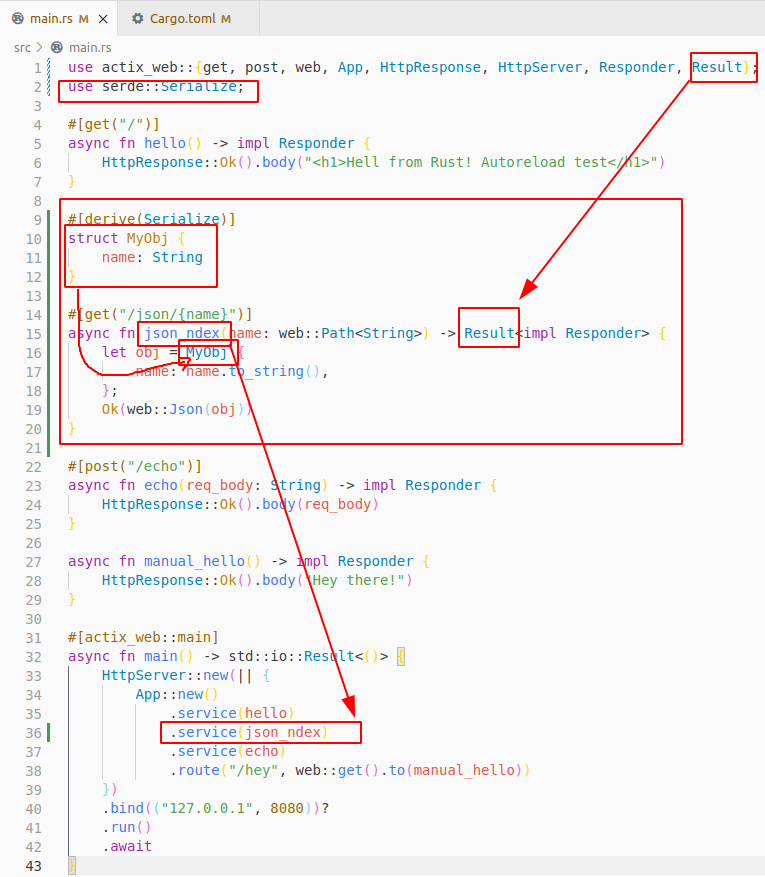rustup tool, which installs the latest stable version of Rust. You might be prompted for your password. If you’re using Linux or macOS, open a terminal and enter the following command:
curl --proto '=https' --tlsv1.2 https://sh.rustup.rs -sSf | shselect steps:
1) Proceed with installation (default)Final Terminal otuput
Rust is installed now. Great!
To get started you may need to restart your current shell.
This would reload your PATH environment variable to include
Cargo's bin directory ($HOME/.cargo/bin).
To configure your current shell, run:
source $HOME/.cargo/env
If you using VSC editor must install this extension: https://marketplace.visualstudio.com/items?itemName=rust-lang.rust
Most importantly: Actix Web runs on Rust 1.54 or later and it works with stable releases.
create new directory and package with command:
cargo new api-rust-actix_web
# result
Created binary (application) `api-rust-actix_web` packageAdd actix-web as a dependency of your project by adding the following to your Cargo.toml file.
[dependencies]
actix-web = "4"
Edit file src/main.rs like this:
use actix_web::{get, post, web, App, HttpResponse, HttpServer, Responder};
#[get("/")]
async fn hello() -> impl Responder {
HttpResponse::Ok().body("Hello world!")
}
#[post("/echo")]
async fn echo(req_body: String) -> impl Responder {
HttpResponse::Ok().body(req_body)
}
async fn manual_hello() -> impl Responder {
HttpResponse::Ok().body("Hey there!")
}
#[actix_web::main]
async fn main() -> std::io::Result<()> {
HttpServer::new(|| {
App::new()
.service(hello)
.service(echo)
.route("/hey", web::get().to(manual_hello))
})
.bind(("127.0.0.1", 8080))?
.run()
.await
}Notice: this command will take some time around 1-2 minutes! to start surver trun command:
cargo run
Final result must be somting like this:
Compiling api-rust-actix_web v0.1.0 (/home/ivanov/sivanov/api-rust-actix_web)
Finished dev [unoptimized + debuginfo] target(s) in 1m 08s
Running `target/debug/api-rust-actix_web`
Open in browser http://127.0.0.1:8080/
Now must be visible blank page only with text: "Hello world!"
To stop server press : "Ctrl + C" Next start of web server will be more fast:
cargo run
Finished dev [unoptimized + debuginfo] target(s) in 0.06s
During development it can be very handy to have cargo automatically recompile the code on changes. This can be accomplished very easily by using cargo-watch.
Optional - Installing cargo wath:
cargo install cargo-watch
WAit again long time :)
Exmaple command:
cargo watch -x 'run --bin [your_app_name]'
now run command with your app name:
cargo watch -x 'run --bin api-rust-actix_web'
result:
Finished dev [unoptimized + debuginfo] target(s) in 4.18s
Notice: this command will nor refresh automatically browser! To test autoreload speed change file main.rs and row like this
#[get("/")]
async fn hello() -> impl Responder {
HttpResponse::Ok().body("<h1>Hell from Rust! Autoreload test</h1>")
}when you save cahnges to file server will auto-reload all automatically
because directory that contains all compiled files and executables "target" is around:
./target
1 587 items, totalling 982,4 MB
#.gitignore
# will have compiled files and executables
debug/
target/
# These are backup files generated by rustfmt
**/*.rs.bk
Add to end of the file Cargo.toml rows:
# for JSON data
serde = { version = "1.0", features = ["derive"] }
Open and add to file src/main.rs : Notice on row on last position we have new include and new new 2-nd "use" row
use actix_web::{get, post, web, App, HttpResponse, HttpServer, Responder, Result};
use serde::Serialize;add after row 8 this new rows:
#[derive(Serialize)]
struct MyObj {
name: String
}
#[get("/json/{name}")]
async fn json_ndex(name: web::Path<String>) -> Result<impl Responder> {
let obj = MyObj {
name: name.to_string(),
};
Ok(web::Json(obj))
}and add after row 25 new with content:
.service(json_ndex)Now is time to visit URL raletaed with JSON responce. Open http://127.0.0.1:8080/json/test
brwoser must return text like this:
{"name":"test"}if you replace last part of url from "test" to "rust" and hit enter you must see:
{"name":"rust"}for more information see oficial documentaion : https://actix.rs/docs/response/
Add JSON support with serde
1 939 items, totalling 1,3 GB
Time investet in this tutorial: 2 h. 30 min.
